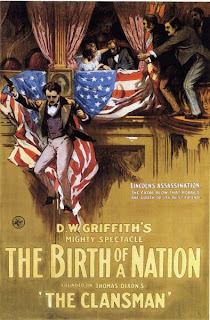On February 8, 1915, D. W. Griffith’s The Birth of a Nation premiered in Las Angeles under the title The Clansman (it was based on a book of that name). The film has become more famous for its depiction of 20th century racial stereotypes than the history of the Civil War and Reconstruction era that it sought to depict. The NAACP protested the film from its debut, citing its racist depiction of African Americans. View an article from the Cleveland Advocate protesting the showing of The Birth of the Nation upon its initial release here.
premiered in Las Angeles under the title The Clansman (it was based on a book of that name). The film has become more famous for its depiction of 20th century racial stereotypes than the history of the Civil War and Reconstruction era that it sought to depict. The NAACP protested the film from its debut, citing its racist depiction of African Americans. View an article from the Cleveland Advocate protesting the showing of The Birth of the Nation upon its initial release here.
The plot of the film revolves around two white families from the north and south during and after the Civil War. It recasts Lincoln as a figure sympathetic to the south and shows a post war south ruined by carpetbaggers, free men and radical Republicans. In the film, the south is only redeemed by the formation of the Ku Klux Klan. The Klan emerge as heroes in the film. In fact, due to their positive depiction in the film, the KKK used it a recruiting tool until the early 1970s.
Black filmmakers who were unsuccessful in banning The Birth of a Nation set out to make their own films to correct the racism they saw in Griffith’s film. A group of independent black filmmakers released director Emmett J. Scott’s The Birth of Race in 1919 as a counter argument to Griffith’s depiction of African-Americans, but it was largely ignored.
With such strong racism throughout the film, you might be asking why this film is remembered at all? Why don’t we just let it die off in historical memory? Well, the film is also one of the first in film history to make use of close-ups, the iris effect, cross cutting between scenes to create suspense, and featured an original score to be performed live in the theater by an orchestra. These innovations, among others, continue to land The Birth of a Nation on lists of the all time best films. The film was also one of the earliest attempts to construct a history using the medium of film, as opposed to print culture.
Birth of a Nation was the first film to be viewed in the White House, and when President Woodrow Wilson saw it he said it was “like writing history with lightning.” We may find the kind of history Griffith depicted in The Birth of a Nation to be morally repugnant, but it did lay a foundation for filmmakers to use film as a way of getting at historical issues and questions.
Here is trailer of The Birth of a Nation:
[Image via moviegoings]







No comments:
Post a Comment